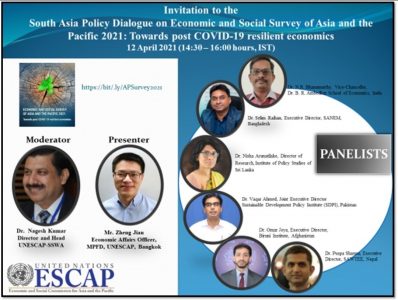April 12, 2021
Dr. Omar Joya, Executive Director of the Biruni Institute, attended the expert panel discussing the UN-ESCAP’s latest report titled “Economic and Social Survey of Asia and the Pacific 2021: Towards post-COVID-19 resilient economies.” The report forecasts that, on average, developing Asia-Pacific economies are expected to grow by 5.9 per cent in 2021 and 5 per cent in 2022, after having experienced an estimated contraction of 1 per cent in 2020. Despite a reasonably strong rebound expected in 2021, a “K-shaped recovery” is likely, with poorer countries and more vulnerable groups marginalized in the post-pandemic recovery and transition period.
The report proposes a “build forward better” policy package for resilient post-COVID-19 economies that aims to ensure universal access to healthcare and social protection, close the digital divide and strengthen climate and clean energy actions.
Discussing the report’s main messages, Dr. Joya elaborated that one needs to acknowledge that long-term policies (for instance, alignment with the 2030 SDG Agenda) may not necessarily help with short-term recovery. It is important to sequence short-term recovery policies and long-term structural policies aimed at strengthening economic resilience. It is becoming more important for the economists and policymakers to better understand how to create synergies between short- and long-term policies in the post-Covid crisis.
Dr. Joya also suggested to have a neutral perspective on the role of the informal economy in countries where formal institutions for risk insurance do not exist. While informal sector is often a source of vulnerability, however in low-income countries like Afghanistan the informal economy can be a source of resilience if formal insurance mechanisms are under-developed and limited.
The panel experts which came from the leading think tanks in South Asia welcomed the report as a timely publication that would help policymakers in South Asian countries to better plan for the post-Covid economic recovery.



